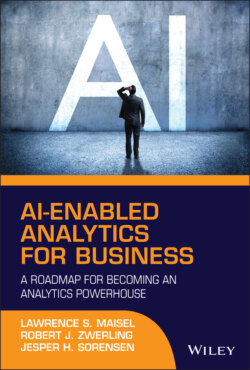Читать книгу AI-Enabled Analytics for Business - Lawrence S. Maisel - Страница 26
DATA SCIENTIST MISCONCEPTION AND MYTH
ОглавлениеMany businesses assume that implementing analytics requires data scientists, as they have the skills required for AI and know how to apply AI in the business. While the former assumption is true, the latter is a misconception.
With respect to knowledge of business, we note that the typical data scientist is essentially a programmer who knows statistics. Their realm is IT and not business, and the two domains are worlds unto themselves. For example, the following bullet points are an excerpt from a profile on LinkedIn for an IT Director of Digital Process Automation for a major insurance company. While there are lots of technical accolades, there is little discussion of business application or benefits, and no delineation of ROI:
Managing a global team of 30+ RPA Architects, Programmers, Data Scientists, Technical Business Analysts and onsite consultants from Appian, InfoSys, IBM, and Cognizant
Managing the implementation of a Business Process Management Tool (Appian) into an on-premises architecture to automate & streamline Client Onboarding
Integrating InfoSys's ML Platform (NIA) and continuing to release new stories in 6-week intervals to generate operational efficiencies
Not to belittle talent, but the wide expanse between IT and business results from the lack of common language and mission. The IT speak in the previous list illustrates that IT and the business are not in the same business—as most of us have experienced.
The business speaks of sales and expenses, whereas IT speaks of systems and technology. As such, it should be no surprise that the typical data scientist is limited in business acumen; thus, engaging the data scientist to implement AI in the business first requires educating them about the business.
For example, a Director of Inventory of a major technology company recounted an exercise in attempting to engage data scientists to develop an application that could yield insights from their data. The amount of time and effort it took to educate the data scientists about the business was so exhausting that the project was abandoned.
The myth of AI and analytics requiring data scientists emanates from the notion that business users lack requisite skills (formal training in mathematics, statistics, and specialized programming languages). This is certainly true for projects that use AI platforms where a combination of data scientists, database administrators, and application programmers is required. However, these complexities can be mitigated with modern AI-enabled analytics software tools that empower business users to engage analytics on their data without incurring the costs and complexities associated with platforms and tools that require specialized resources.
